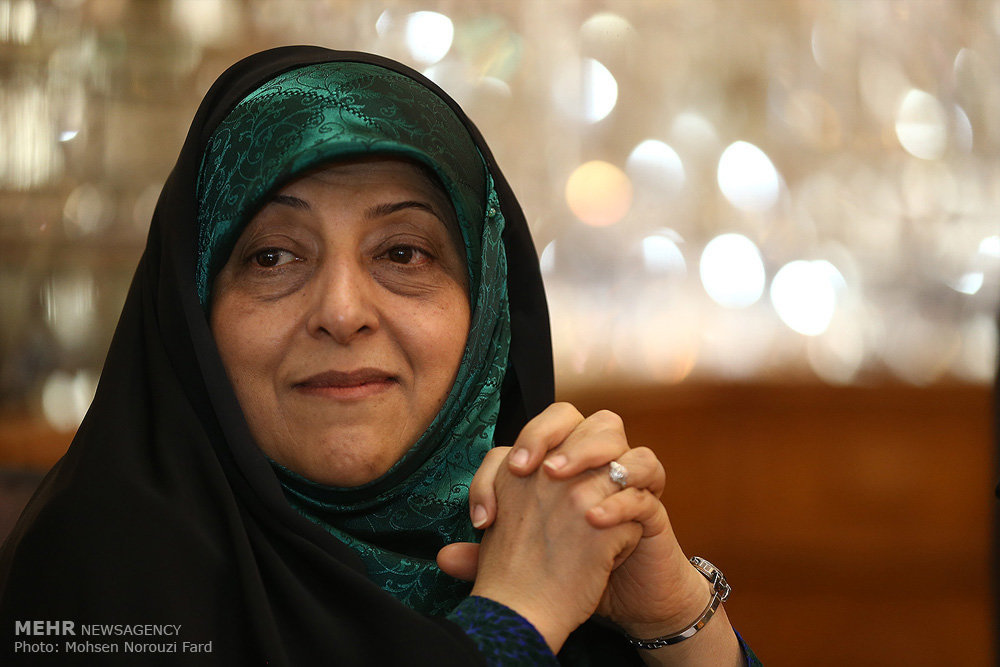Time ripe in New Year to rethink our environmental responsibilities

TEHRAN — The coincidence of the Iranian new year with spring implies that everything is about to revive in the upcoming year, particularly the environment.
With the trees blooming and springs bubbling once again the New Year starts. The ever changing nature teaches us to keep changing towards perfection.
The Tehran Times carried out an exclusive interview with the chief of the Department of Environment Masoumeh Ebtekar on March 11, discussing measures taken so far and hopes they hold for Iran’s environmental status in the new year.
“The coming Iranian [calendar] year, Noruz, is an important event for Iranians which not only marks the beginning of the new year but also the beginning of spring and the revival of nature,” Ebtekar said. “It is an important opportunity for all of us to think about our responsibilities particularly in face of protecting and conserving nature and how we can work to improve the condition of our environment individually and collectively in terms of clean air, clean water, clean soil, and protecting the valuable biodiversity.”
She went on to say that “[For the next year] we are going to [keep pursuing] our strategies in different areas pertaining to the improvement of the environment. One of the most important strategies which we will pursue is combating air pollution in our major cities; we have nationwide programs to curb air pollution but we also have [separate] air pollution abatement programs for each and every megacities in Iran underway and we will continue these programs in the upcoming Iranian year.”
Upgrading the quality of fuel, [modernizing] automotive industry at the national level, [improving] vehicle inspection services, switching from Mazut to natural gas in power plants by 94 percent, phasing out 90,000 obsolete cars nationwide, and replacing clunker taxis are some of the measures taken to mitigate air pollution which will be adopted next year [as well], Environment chief explained.
Increasing investment in renewable technologies in the upcoming months, especially solar energy with national and international financial aids [is on the agenda], she underscored; “There is going to be a lot of emphasis on renewable energies this year which both help reduce greenhouse gas emission and control air pollution.”
The issue of protecting our water resources and wetlands which are facing challenges mainly due to climate change but also unsustainable practices particularly agricultural practices [need to be addressed]; “we need to change these current agricultural and irrigation patterns and the government has worked and invested in this area and we have now completed studies for most important wetlands in Iran on how to restore them and to ensure proper management of these wetlands to improve their condition,” Ebtekar stated.
Restoration of Hour-al-Azim wetland in southwestern province of Khuzestan is also underway. Hour-al-Azim is an important wetland on the border with Iraq was dried up due to projects in petroleum sector. Currently 70 percent of the Hour-al-Azim is now covered with water, she highlighted.
“Additionally to combat dust storm we have [worked out] some strategies on national level,” she noted, “Firstly we have fully studied the hotspots for dust storms in Iran and devised national, provincial, and local plans to address these hotspots which will continue next year.”
All environmental projects are cross-sectoral, she emphasizes, “the Department of Environment is in charge of policy formulation, regulation, and coordination but the implementation of each project is [facilitated] by various organizations.”
Commenting on raising awareness among the public she pointed out that “another important area we will focus on [next year] are education and culture.” “We have nationwide environmental field underway in association with Ministry of Education and Ministry of Science; green universities are now implementing their projects in terms of energy efficiency, water efficiency, and waste management.”
There are 106,000 schools in Iran each now have environment management fields and we are working to educate the teachers on how to properly implement environmental management programs, she stated.
“We have now over 800 active environmental NGOs raising awareness and also implementing and helping to implement environmental projects,” she expressed.
“We have now people on board,” she said, adding, “We have a lot of celebrities working for us as the messengers and ambassadors of the environment and athletes promoting the environment.” In addition the International Green Film Festival is also a very important cultural event and one the most important film festivals in the region.
“We have a lot of work to do for the next year and we are full of hope, because we know once we have the people on board and once we gain the hearts and minds of the people it would be much more possible to address immense environmental challenges that we have ahead of us,” Ebtekar suggested.
“We are hopeful and hope God will help us both with the assistance of the public and taking into consideration that the current administration has a lot of issues and challenges but the environment has been its major priority,” she added.
“We pray to God that we realize those hopes and aspiration in the upcoming year.”
MQ/MG
